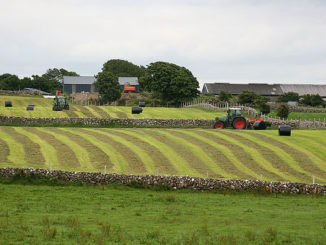In Poland 1.36million agricultural producers benefit from direct payments, but only small percentage of them are benefiting from the Rural Development Plan. This includes about 26 000 organic farmers. But what’s in the current plans for organic farmers, and for agri-environment schemes? Its not looking good so far, as limits have been imposed, even from the consultation stage.
For the consultation of the second draft of RDP 2014-2020 – a program of the development of rural areas for the next 7 years and affecting rural areas indefinitely, only 14 days were offered, after many protests this was extended to 18 days
Despite these and other shortcomings, 1200 private persons, companies and organisations have send their comments to the Ministry of Agriculture and Rural Development.
The proposed draft was assessed by many farmers as even less attractive than two previous programmes. Difficulties have emerged for young farmers, for modernization of farms, for private advisors, for Natura 2000, agri-environmental-climate program and organic farming.
The main problem is the limitation of the support for organic farmers and farmers implementing agri-environmental programmes only to the first 30 ha, which is a big barrier for the mid-sized and larger farms, especially in the northern part of Poland.
Organic farmers too, if market and export orientated, need bigger holdings and uniform quality products. Thus they have been expanding up to 50 and sometimes even 100 ha. Now, they will be punished for the development. The supposed logic is active farming – in the past the big land owners were paid for hundreds of hectares with no production. The flaw however is that payments for conventional big land owners continue, without such limits: only all medium and big organic farmers will suffer. According Single Area Payments System (SAPS) the direct payment in Poland are connected to the acreage without any areal limit, the limitations are proposed only for payments for organic farms and agri-environmental programmes.
Even a potential positive carries negatives. Now only organic farmers producing organic products will got the payment. However some organic farmers will suffer with this set up. This includes farmers with areas used for young plantations of berry fruits, which must be renewed – every 2-3 years in case of strawberries and 7-10 years in case of raspberries. And what about the fields used in the crop rotation for green manure or for the animal feed when the animals are not sold? The obligation of issuing VAT invoices will be a trap for small farmers, who have difficulties selling products and accessing markets.
There are also strange exemptions. Because some land owners were planting hundred of hectares of mini-walnuts in order to get the payments, since 2009 the walnuts and hazelnuts are not supported. However in traditional regions with a warmer climate in south-east Poland, farmers have for over 100 years produced, sold and now are still producing and selling organic walnuts, but without supports.
On the list of supported species in the package “Sustainable farming” however are some wild plants as for example houndstongue (Cynoglossum officinale), figwort (Scrophularia nodosa), swamp milkweed (Asclepias incarnata), which are and will be supported from unknown reasons. To make the story more complicated extensive permanent grassland will be not supported anymore. Farmers can not understand why for example nettle and greater burdock on neglected areas are more eligible for payments than extensive permanent grassland, full of different species of grasses and wild plants, a feeding area not only for the cattle, but also for many insects and birds. Is it a mistake or on purpose?
That kind of “development” is not understandable for farmers, because it is in conflict with the basic agriculture knowledge and praxis and leads to the loss of confidence to the Common Agriculture Policy. If the draft will be not corrected, the farmers will rather put the “Rural Development Program 2014-2020” to on the shelf along with all their other science-fiction books.
Main decisions on finance and Pillar 1
Polish authorities are quite happy with the new CAP : the fourth largest agricultural EU country will get an extra € 3 Bio compared to the previous period : € 37 Bio, of which € 24 Bio for direct payments only. Poland will continue to apply the current Single Area Payment System (SAPS) system and will shift 25 % of Pillar 2 to Pillar 1 per year (€ 390 Mio) while cuts to Pillar 2 will be compensated by a € 5 Bio cohesion funds envelope for rural infrastructures.
National objectives are : improve competitiveness of rural areas, support family farming, young farmers and livestock sectors. Poland will use coupled payments for national payments for beef and sheep in few voivodships (provinces), fodder plants on permanent grassland and leguminous and will kept some aids for hemp, potato starch, tobacco in 2014 (article 68). Authorities and tobacco growers are worried that coupled aids for tobacco will be no longer possible, as it seems it helps to support many jobs in the East regions. Introduction of degressive payments above € 150,000 is assessed since the top-up on first hectares has been rejected.
On Greening, talks have involved only scientific from research institutes and the agricultural ministry; a concern is to get a full list of EFAs that address the diversity of polish farming, excluding any set aside.





